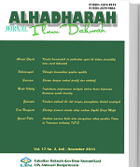Implementasi Dakwah Dalam Komunikasi Pembangunan
DOI:
https://doi.org/10.18592/alhadharah.v12i23.1767Keywords:
dakwah, communication, development communicationAbstract
Islamic Communication (Dakwah) is a part of the development communication. However, some of national development programs which aim to change the social notion and behavior, have not been properly appreciated by the Islamic Scholars. Absolutely not, the role of these Islamic Scholars in relation to increase the concept of communication would essentially bring positive impact to succeed the national development. The interaction of Islamic Scholars, either directly or indirectly, through the verbal and contextual communication, or even through the other media, would influence the program of national development nowadays.References
Afandi, Bisri. 1984. Beberapa Percikan Jalan Dakwah. Surabaya: Fakultas Dakwah. Armstrong, Sue. 1991. Pengaruh Rokok Terhadap Kesehatan. Jakarta: Arcan. Azis, Al Imam Abdul. 2007. Dakwah Ke Jalan Allah Dan Akhlak Seorang Da’i. Terjemahan Abu Salma Al Atsari, Malang. Effendy, Onong Uchjana. 2006. Ilmu Komunikasi: Teori dan Praktek. Bandung: Remaja Rosdakarya. Nasution, Zulkarimen. 2004. Komunikasi Pembangunan: Pengenalan Teori dan Penerapannya. Jakarta: PT. Raja Grafindo Persada. Natsir, M. 1991. Fiqh al-Dakwah. Semarang: Ramadhani. Nawawi, Ismail. 2009. Pembangunan dan Problema Masyarakat: Kajian, Konsep, Model, Teori, dari Aspek Ekonomi dan Sosiologi. Surabaya: Putra Media Nusantara. Rani, Samsul. 2010. “Peluang Dan Tantangan Inovasi Dakwah.” Al Hadharah, Vol 9:96. Banjarmasin: Fakultas Dakwah IAIN. Schramm, Wilbur. 1964. Mass Media And National Development. California: Stanford University Press. Tim Penyusun Ensiklopedia Islam. 1996. Ensiklopedia Islam I ABA-Far. Jakarta: PT. Iktiar Baru Van Hoeve. Yakub, H. Hamzah. 1981. Publisistik Islam; Teknik Dakwah dan Leadership. Bandung: Diponegoro. Zahrah, Abu. 1994. Al-Da'wah ila AlIslam, diterjemahkan oleh H. Ahmad Subandi danAhmad Supeno dengan judul Dakwah Islamiyah. Bandung: Remaja Rosda Karya
Downloads
Published
How to Cite
Issue
Section
License
Authors retain copyright and grant the journal the right of first publication, with the work simultaneously licensed under the Creative Commons Attribution-NonCommercial 4.0 International Public License (CC BY-NC 4.0). This license allows reusers to distribute, remix, adapt, and build upon the material in any medium or format for noncommercial purposes only, provided that proper attribution is given to the original creator.







